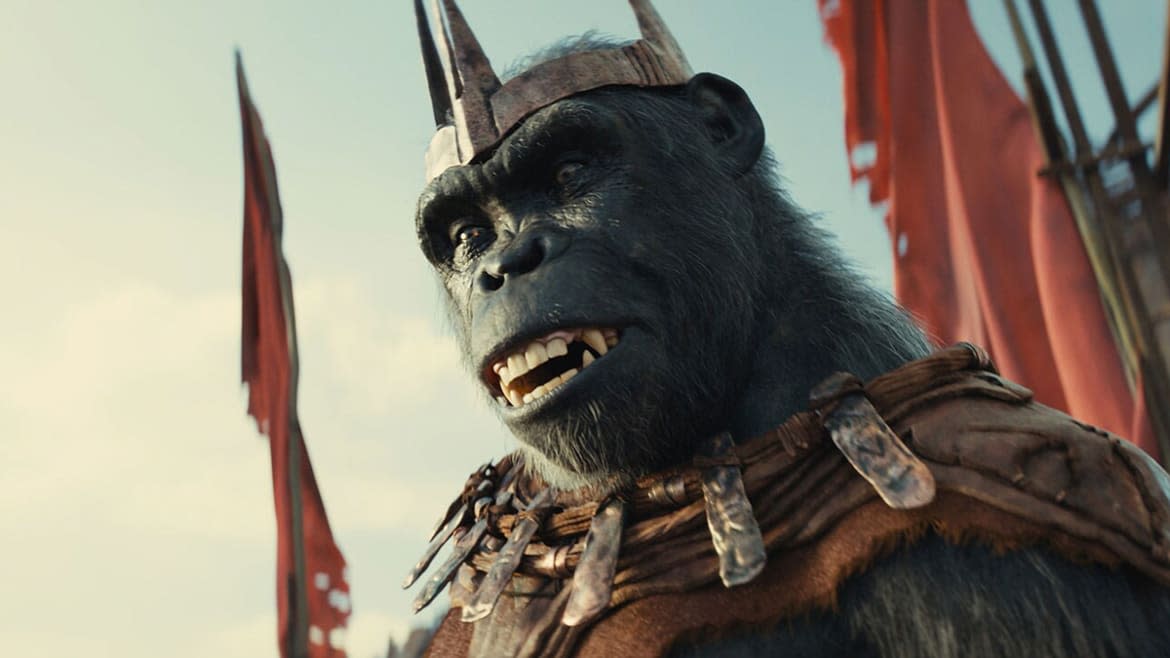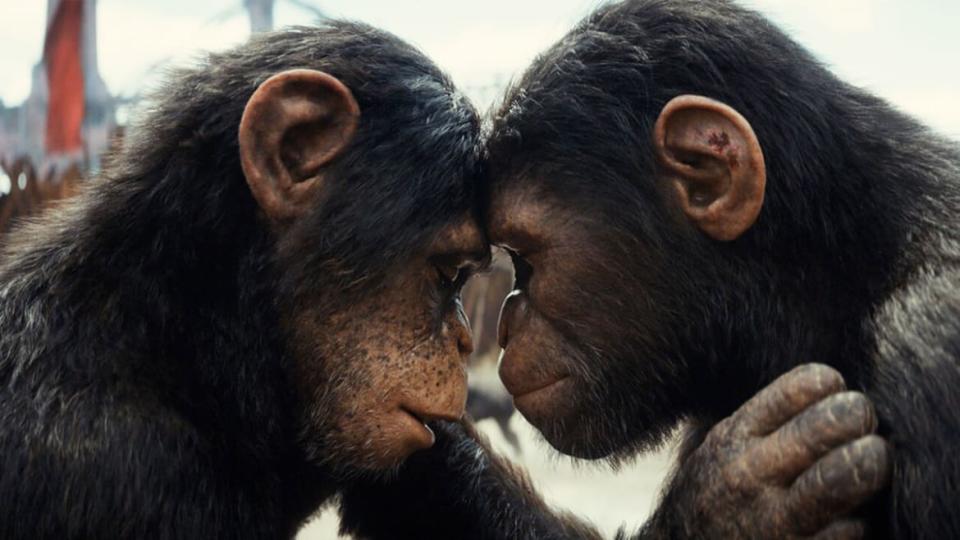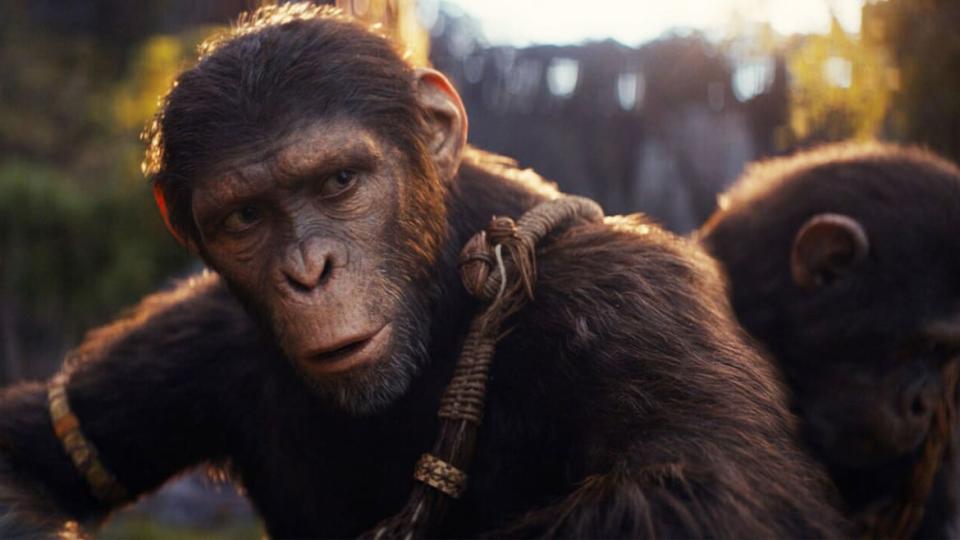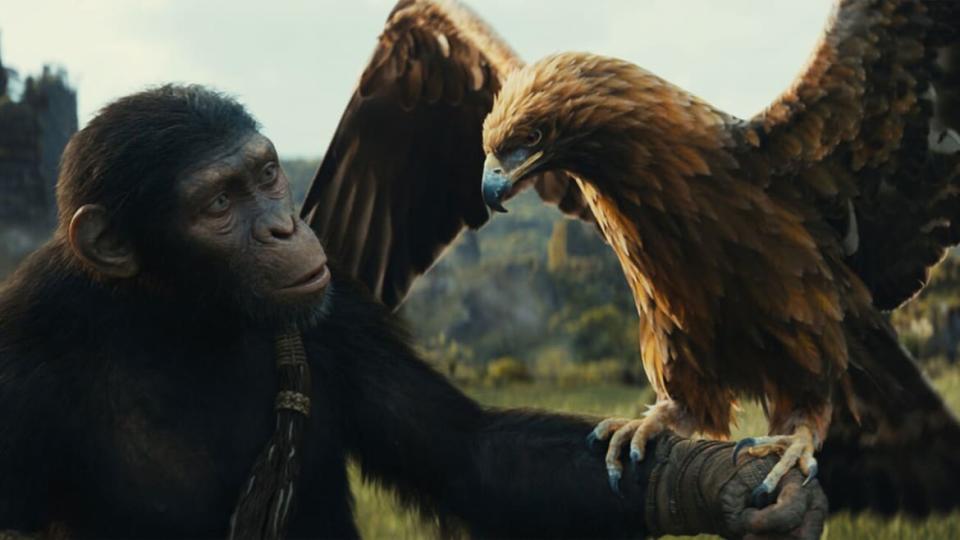The New ‘Planet of the Apes’ Sequel Is a Disappointing Slip on a Banana Peel

Evolution is at the heart of the Planet of the Apes franchise, and yet for its fourth installment in its current reboot phase (and tenth chapter overall), it doesn’t progress so much as stand still. Set generations after 2017’s War for the Planet of the Apes, Wes Ball’s Kingdom of the Planet of the Apes (in theaters May 10) gets close to the future that was first envisioned by Franklin J. Schaffner’s 1968 original, with apes now civilized and verbose, and humans mostly reduced to primitive muteness. As such, this sequel is an attempt to move forward by returning to its roots—a have-it-both-ways approach that prevents catastrophe but also neuters most of its novelty. Too often rehashing its myriad predecessors’ ideas, conflicts, and images, it’s a competent if unexceptional blockbuster game of monkey see, monkey do.
It’s been centuries since Caesar, the first hyper-intelligent ape, led his simian comrades to an idyllic sanctuary where they could thrive without the murderous interference of mankind. In this present, Noa (Owen Teague) and his friends Soona (Lydia Peckham) and Anaya (Travis Jeffrey) climb peaks to reach eagles’ nests in order to steal eggs as part of a ritual in which primates bond with fowl. Noa’s big day is spoiled the evening prior, however, when his egg is crushed during an encounter with a mysterious human intruder who scampers off into the dark before being caught. Desperate to find another egg, the young chimp ventures out of his village at night by himself, only to run into a group of deadly apes with buzzing zap sticks who find their way back to Noa’s peaceful forest-grove home and burn it to the ground, in the process enslaving its inhabitants and murdering Noa’s bird-taming father.
Driven to seek vengeance as well as to rescue his kin, Noa sets out through a tunnel to the forbidden “Valley Beyond,” where he meets orangutang Raka (Peter Macon), who teaches him about Caesar—and his belief that apes should stick together and not kill each other—and chooses to accompany him on his quest. They’re soon joined by an unlikely companion: Nova (Freya Allan), a feral human who’s trailing Noa and whose name is given to her by Raka in an homage to a character from War for the Planet of the Apes.
Together, the three are almost immediately hunted by the apes who ravaged Noa’s community, resulting in a series of set pieces that director Ball stages with a vigorousness that’s enhanced by his superb blending of live-action and CGI. Dynamic during its every skirmish and chase, Kingdom of the Planet of the Apes comes close to matching the aesthetic splendor of the Matt Reeves-helmed films that came before it, exhibiting a deftness and potency that keeps the material humming for its entire 145 minutes.

Soona (played by Lydia Peckham) and Noa (played by Owen Teague)
Visually, Kingdom of the Planet of the Apes benefits from first-rate motion-capture effects that make Noa and his friends and enemies both convincing and compelling. Even without the participation of Andy Serkis, the master of this performative form, the film’s apes are strikingly lifelike in terms of look and personality, and Noa—brave, sensitive, and determined to prove himself—makes for a serviceable protagonist, even if he ultimately pales in comparison to the noble Caesar. More distressing is that his is a rather routine rescue-and-revenge story, and the lessons he learns about apes’ and humans’ fraught past are only revelatory to him—except for the unwelcome new wrinkles that Josh Friedman’s script throws into the established mix.
Those concern the true nature of Nova, and serve as the biggest surprises of Kingdom of the Planet of the Apes. They’re also, alas, the most puzzling aspects of this affair, since even minor consideration of what’s being presented raises a host of questions that the proceedings don’t answer so much as simply expect audiences to blindly accept. This isn’t a ruinous state of affairs but it does undermine the film’s basic premise. So too does the fact that there’s little beneath this tale’s surface except familiar themes of tolerance, coexistence, power, and selflessness. Can man and ape find a way to see past their differences (and yesterday’s traumas) to forge a brighter tomorrow together? It won’t surprise anyone to hear that the jury remains out until the very end of this adventure, which is nothing if not a venture designed to breed even more Planet of the Apes episodes.

Noa (played by Owen Teague)
Kingdom of the Planet of the Apes is a handsomely mounted, well-plotted, intermittently thrilling summer extravaganza that, no matter its merits, never justifies its existence except as a bottom line-driven brand extender. Apes on horseback? Seen it. Apes turning on each other, thereby betraying Caesar’s cardinal rule? Been there. Apes and humans forming uneasy alliances even as they vie for top-of-the-food-chain status? Done that.
Every time Ball’s film leaps, swings and barrels into photorealistic action, it’s easy to forget what its down-time moments underscore: namely, that there’s nothing particularly fresh about this endeavor, save for a charismatic villain in Proximus Caesar (Kevin Durand)—a vicious tyrant who wants to open a beachside “vault” in order to seize the weapons and technology stored within—as well as a few late bombshells that land with a nonsensical thud.

Noa (voiced by Owen Teague)
There are plenty of highs in Kingdom of the Planet of the Apes but they can’t overshadow the nagging sense that all of this melodrama and mayhem is less necessary than obligatory. At its conclusion, Friedman’s screenplay ably splits viewers’ rooting interest between ape and human. Before that, however, there’s scant tension to this latest simian spectacular, whose expert formal construction can’t compensate for its lack of invention.
Perhaps in the next movie, Freya Allan’s Nova will develop into a charismatic main character rather than a formulaic device, Owen Teague’s Noa will further set himself apart from his legendary ape ancestor, and the duo’s ongoing relationship will mutate into something more complex than their current frenemies rapport. For now, though, the franchise’s growth appears to have tapered off, suggesting—as its overarching narrative does—that evolution is an exceedingly tricky thing to control.
Get the Daily Beast's biggest scoops and scandals delivered right to your inbox. Sign up now.
Stay informed and gain unlimited access to the Daily Beast's unmatched reporting. Subscribe now.


